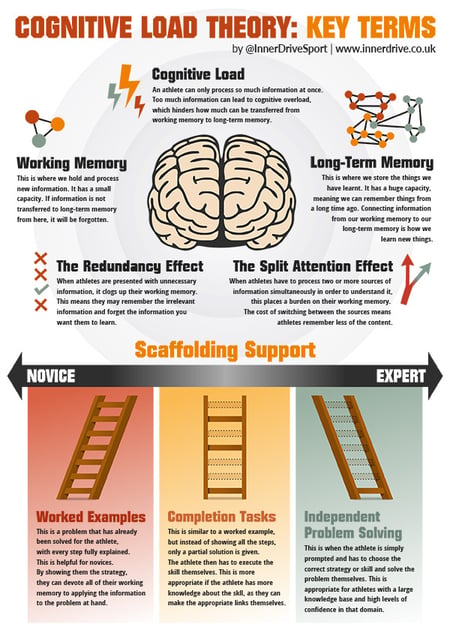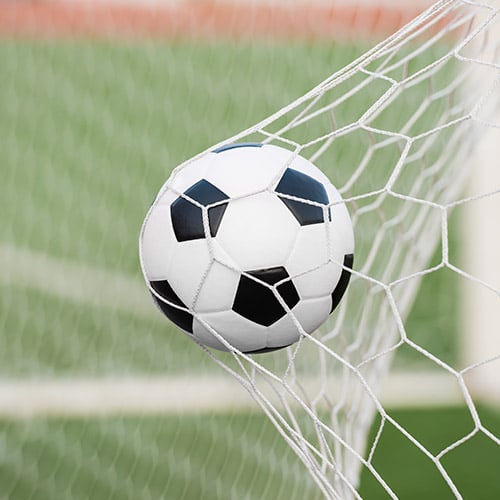Cognitive Load Theory is a psychological theory that every coach needs to know about. If you are not already familiar with this theory, here is a quick rundown of what it is and how to apply some of the key principles to your coaching…
What is Cognitive Load Theory?
Cognitive Load Theory highlights how working memory has a limited capacity. Working memory is where we hold and process new information — for learning to take place, this information has to be transferred to long-term memory.
That sounds simple enough; however, there is a bottleneck between the two, meaning that information that doesn’t get transferred across is ultimately lost and forgotten. Cognitive Load Theory is all about acknowledging this bottleneck and presenting information to athletes in a way that aids and accelerates that transfer to long-term memory.
How can Cognitive Load Theory be incorporated into your coaching?
Different concepts and ideas have been developed in relation to Cognitive Load Theory to help improve learning and reduce the chances of overload happening. These are important for you to know as a coach to help you improve your coaching methods and boost learning in your athletes. Let’s take a look at a few of them…
The Redundancy Effect
When an athlete’s working memory becomes clogged up with unnecessary information, the brain suffers from what is known as cognitive overload. In this bottleneck, the athlete may only transfer the irrelevant or redundant information, not the key learning points.
The Redundancy Effect often hinders learning due to this inefficient use of working memory resources. For coaches, this means that you should:
- Be clear and concise with any instructions or feedback. Remember: you want athletes to remember the important parts, not the redundant bits.
- If formally presenting to a group, then reduce the words and animations on your PowerPoint slides.
- If you are showing key information on a screen, then don’t talk over it. Give athletes time to understand and absorb it first.
The Split Attention Effect
The Split Attention Effect occurs when people have to refer to two different sources of information simultaneously when learning something. This creates an extra load on their brain, as switching between tasks takes time, effort and energy.
It is best thought of as an act of juggling, where each item of information represents one ball. Ask a novice juggler to use too many balls and inevitably some will get dropped. So, what can you do to limit this from happening?
- Use one source of information during any demonstrations. Be clear about what you want athletes to pay attention to.
- Use integrated diagrams. Integrating words within a diagram reduces load and boost memory.
Scaffolding
Scaffolding is a method whereby you gradually remove support as the learner begins to progress. It helps to guide athletes to learn independently and manage their load. This is important when it comes to different levels of learners: some are just starting out, and some are experts. You can use this to offer different levels of support.
- Novices or beginners benefit greatly from worked examples. In practice, this can be showing the learner a visual representation of the skill being successfully completed through a demonstration or video and working through the steps with them.
- Intermediates benefit from completion tasks. They are similar to the worked examples mentioned above, but are only completed partially – the learner can then complete the rest of the task themselves. An example of a completion task would be a skills-based drill that gets progressively harder each round.
- Experts benefit from independent tasks, which are more suitable for learners who are fully proficient with the skill. At this stage, the information is in their long-term memory, allowing more space in their working memory to help solve the problem. Allowing them to independently problem-solve drills whilst still being available when they ask for help will contribute positively to their expertise.
This method of coaching is beneficial because it provides athletes with enough structure so as not to not overwhelm them at their current level, but still stretches them enough to expand their knowledge.
Emotional control
There is also an added factor of feeling stress and pressure when competing in sport. This stress can overload the brain and lead to a decline in all cognitive functions.
Research shows that experiencing an interference or overload on cognition is strongly associated with poor performance relating to memory and processing.
If athletes are dealing with a high cognitive load then it can be mentally exhausting and bring about poor performance. This can lead to an athlete experiencing negative emotions, which in turn can affect their confidence and motivation. Because of this, cognitive load has been described as closely related to the emotional state of the athlete.
Given that athletes perform under a variety of cognitive loads, we think it’s important to help athletes to learn how to control their emotions when there is a lot of information for them to take in. Here are 10 ways that athletes can control their emotions better:
- Use music
- Think about self-talk
- Use relaxing imagery
- Challenge self-handicapping thoughts
- Learn to face their fears
- Relax their body
- Learn from others
- Develop self-awareness
- Reframe their negative thoughts
- Take deep breaths
Final thoughts
Every team and every athlete is different, so think about how you can integrate these tips into your coaching. Remember that Cognitive Load Theory is all about acknowledging the bottleneck between the short and the long-term memory.
Being aware of the Redundancy Effect, the Split Attention Effect, and using worked examples and completion tasks to incorporate scaffolding into your coaching should really help.






